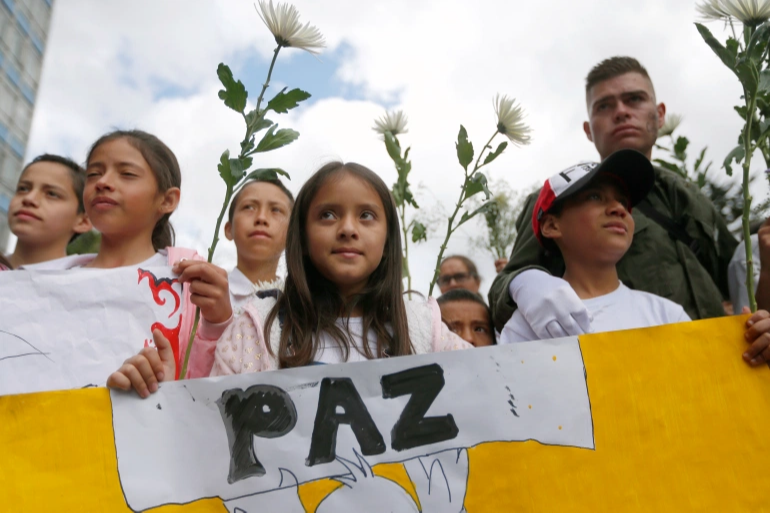
People take part in a rally against violence, following a car bomb explosion, in Bogota, Colombia. [File: Luisa Gonzalez/Reuters]
Bogota, April 27 (RHC)-- More than 27,000 people have been displaced in Colombia in the first quarter of 2021, the country’s human rights ombudsman said, as the South American nation grapples with a surge of violence. People have been forced from their homes amid threats, murders, forced recruitment by armed gangs and clashes between armed groups in lawless areas, the ombudsman said on Monday.
Displacement in the first quarter of 2021 jumped by 177 percent compared to the same period last year. Colombia has witnessed an uptick in violence amid the COVID-19 pandemic, with the United Nations saying in February that the country “continued to face endemic violence” throughout 2020.
“In various parts of Colombia, there has been an intensification of violence and increased territorial and social control by non-state armed groups and criminal groups,” the UN High Commissioner for Human Rights said in its annual report.
The UN said it had documented an increased number of massacres and human rights violations against rights defenders last year in areas without a strong state presence.
The International Committee of the Red Cross (ICRC) also said in March that Colombia was facing at least five continuing conflicts with armed groups that were affecting the daily lives of Colombians. The group reported at least 389 people – mostly civilians – were killed by explosive devices in 2020, the highest tally since 2016.
The Colombian government signed a peace deal with the Revolutionary Armed Forces of Colombia (FARC) leftist rebels in 2016 that aimed to end a conflict that killed more than 260,000 people and displaced millions. But violence has been gradually increasing.
In late March, the government accused FARC dissidents – who have rejected the 2016 peace agreement – of detonating a car bomb in the town of Corinto, about 60km (37 miles) south of Cali in western Colombia.
The attack injured dozens, including several public officials.
Around the same time, one of the most notorious ex-FARC leaders urged the United States to help Colombia implement the peace accord.
In a letter, Rodrigo Londono highlighted the continued killings of ex-fighters and social leaders and asked the US Congress to “again call on the government of Colombia to make a final decision to implement the Peace Agreement in a comprehensive way”.
He also urged the U.S. to encourage Bogota “to begin the promising process of developing our country to embrace lasting proposals to eradicate drug trafficking, modernize the territory and protect life”.

